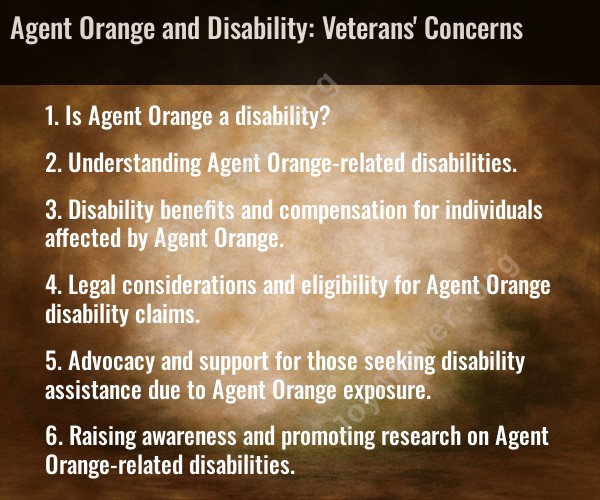Is Agent Orange a disability?
Agent Orange is not a disability in itself, but it is a chemical herbicide that has been linked to various health conditions and disabilities, particularly among veterans who were exposed to it during the Vietnam War. Agent Orange was used by the U.S. military to defoliate dense vegetation, primarily in Vietnam, from 1961 to 1971. The herbicide contains a toxic chemical called dioxin, which is known to have harmful effects on human health.
Exposure to Agent Orange has been associated with several medical conditions, and many veterans who were exposed to it have experienced health issues as a result. Some of the conditions and disabilities associated with Agent Orange exposure include:
Cancer: Agent Orange exposure has been linked to various types of cancer, including prostate cancer, lung cancer, and non-Hodgkin's lymphoma.
Type 2 Diabetes: There is a higher prevalence of type 2 diabetes among veterans exposed to Agent Orange.
Ischemic Heart Disease: Agent Orange exposure has been associated with an increased risk of heart disease.
Neurological Disorders: Some veterans have reported neurological issues, including Parkinson's disease and peripheral neuropathy.
Respiratory Disorders: Exposure to dioxin can lead to respiratory problems, such as chronic obstructive pulmonary disease (COPD).
Skin Conditions: Certain skin conditions, including chloracne, have been linked to Agent Orange exposure.
Veterans who developed these health conditions as a result of their exposure to Agent Orange may be eligible for disability benefits and healthcare services through the U.S. Department of Veterans Affairs (VA). The VA recognizes specific conditions as "presumptive" for veterans who served in certain areas of Vietnam during the designated time periods and experienced Agent Orange exposure.
If you are a veteran or know a veteran who may have been exposed to Agent Orange and is experiencing health issues, it's important to contact the VA and discuss the available benefits and support. The VA has established programs to assist veterans in obtaining compensation and medical care for conditions related to Agent Orange exposure.
Understanding Agent Orange-related disabilities
Agent Orange is a herbicide that was used by the United States military during the Vietnam War. It was contaminated with a highly toxic dioxin called TCDD. Exposure to TCDD can cause a variety of health problems, including cancer, birth defects, and other disabilities.
Some of the Agent Orange-related disabilities that are recognized by the US Department of Veterans Affairs (VA) include:
- Chloracne
- Non-Hodgkin's lymphoma
- Hodgkin's disease
- Chronic lymphocytic leukemia
- Multiple myeloma
- Porphyria cutanea tarda
- Soft tissue sarcoma
- Respiratory cancers
- Type 2 diabetes
- Parkinson's disease
- Ischemic heart disease
- Peripheral neuropathy
- Spina bifida
- Cleft lip and palate
- Congenital heart defects
Disability benefits and compensation for individuals affected by Agent Orange
The VA provides a variety of disability benefits and compensation to individuals who have been disabled by Agent Orange exposure. These benefits can include:
- Monthly disability payments
- Medical care
- Vocational rehabilitation
- Educational assistance
- Death benefits
Legal considerations and eligibility for Agent Orange disability claims
To be eligible for Agent Orange disability benefits, you must have been exposed to Agent Orange while serving in the US military and you must have a disability that is recognized by the VA as being related to Agent Orange exposure.
The VA has a list of presumptive diseases that are assumed to be caused by Agent Orange exposure. If you have one of these diseases and you served in Vietnam, you will not need to provide evidence of exposure to Agent Orange.
If you have a disability that is not on the presumptive list, you will need to provide evidence that you were exposed to Agent Orange and that your disability is related to your exposure.
Advocacy and support for those seeking disability assistance due to Agent Orange exposure
There are a number of organizations that provide advocacy and support to individuals who are seeking disability assistance due to Agent Orange exposure. These organizations can help you with the claims process and can provide you with information and support.
Some of these organizations include:
- Vietnam Veterans of America
- Veterans of Foreign Wars
- Disabled American Veterans
- Paralyzed Veterans of America
- Agent Orange Survivors Vietnam Alliance
Raising awareness and promoting research on Agent Orange-related disabilities
There is still much that is unknown about the long-term health effects of Agent Orange exposure. It is important to raise awareness of Agent Orange-related disabilities and to promote research on these disabilities.
Some ways to raise awareness and promote research include:
- Contacting your elected representatives and urging them to support legislation that would provide more funding for research on Agent Orange-related disabilities.
- Donating to organizations that are supporting research on Agent Orange-related disabilities.
- Sharing your story and the stories of others who have been affected by Agent Orange-related disabilities.
By raising awareness and promoting research, we can help to ensure that those who have been affected by Agent Orange-related disabilities receive the support and services they need.













